How to Sell Supplements Online a Complete Guide
Learn how to sell supplements online with our complete guide. Discover expert tips on legal compliance, sourcing, and marketing to build a thriving brand.
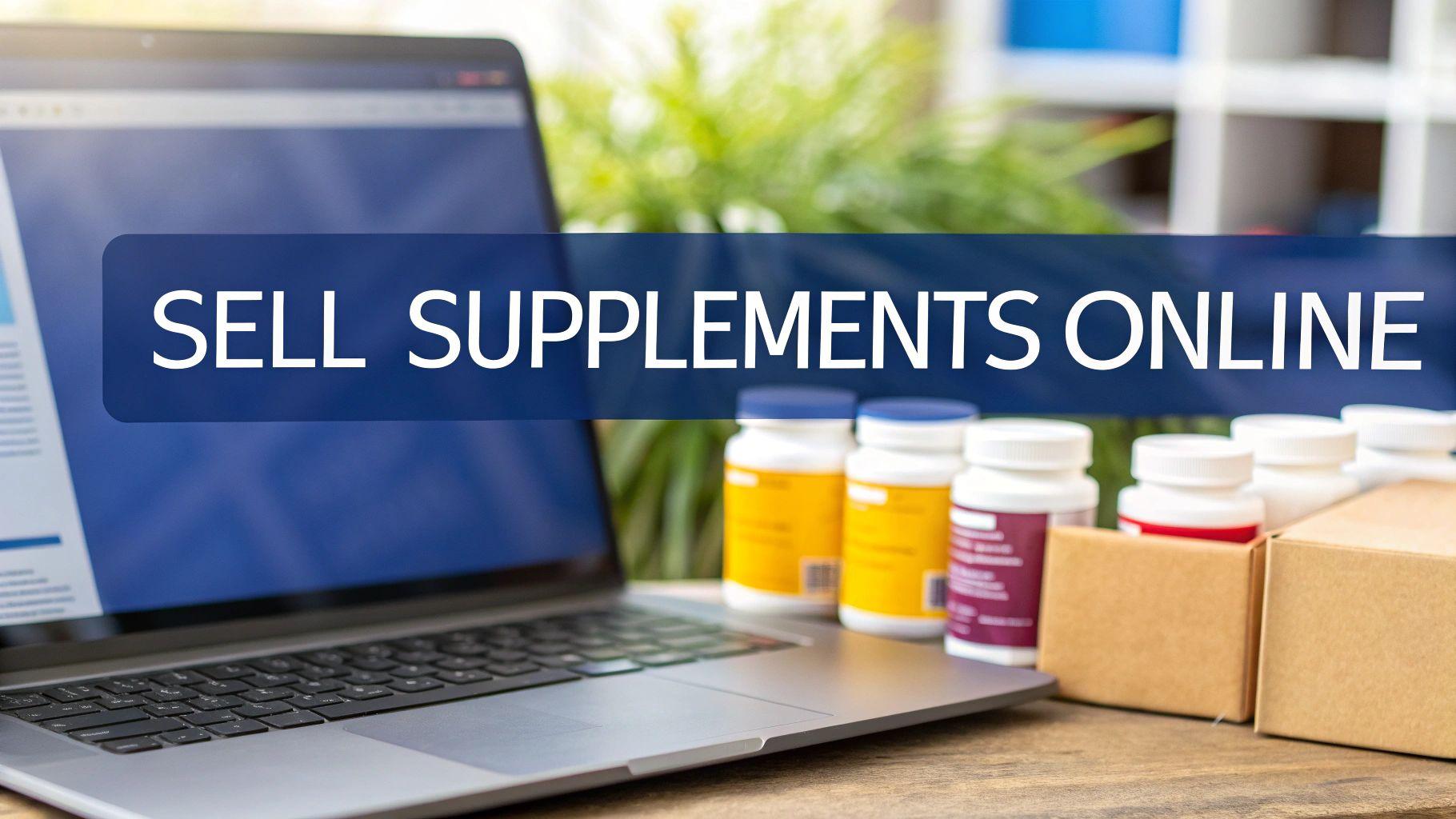 Get a Free Quote Today!
Get a Free Quote Today!Before you can even think about selling your first bottle of supplements, you need to lay a solid foundation. This isn't the glamorous part, but getting it right from the start saves you massive headaches down the road. It all begins with a clear vision of who you're serving and how you'll operate within the rules of the game.
The supplement market is enormous—we're talking a global valuation of $412.84 billion. But that size also means it's crowded. You can't be everything to everyone.
Finding Your Niche and Your People
The fastest way to get lost in the noise is to launch a generic "multivitamin for adults." Instead, you need to get specific. Who exactly are you trying to help? The more narrowly you can define your customer, the easier it will be to create products and marketing that truly connect with them.
Think about a specific problem you can solve for a specific group of people.
- Pre-workout supplements for endurance athletes, not just "gym-goers."
- Nootropics designed for busy professionals juggling multiple projects.
- Botanical blends specifically targeting stress relief for parents.
- Weight management formulas with completely transparent ingredients for label-conscious consumers.
My take: Zeroing in on a customer group early is the secret sauce. It dictates everything—from your ingredient choices to the tone of your emails. Don't skip this step.
The chart below gives you a sense of where the search interest lies across a few broad categories. It’s a good starting point to see general demand, but your real opportunity is in the sub-niches within these big players.
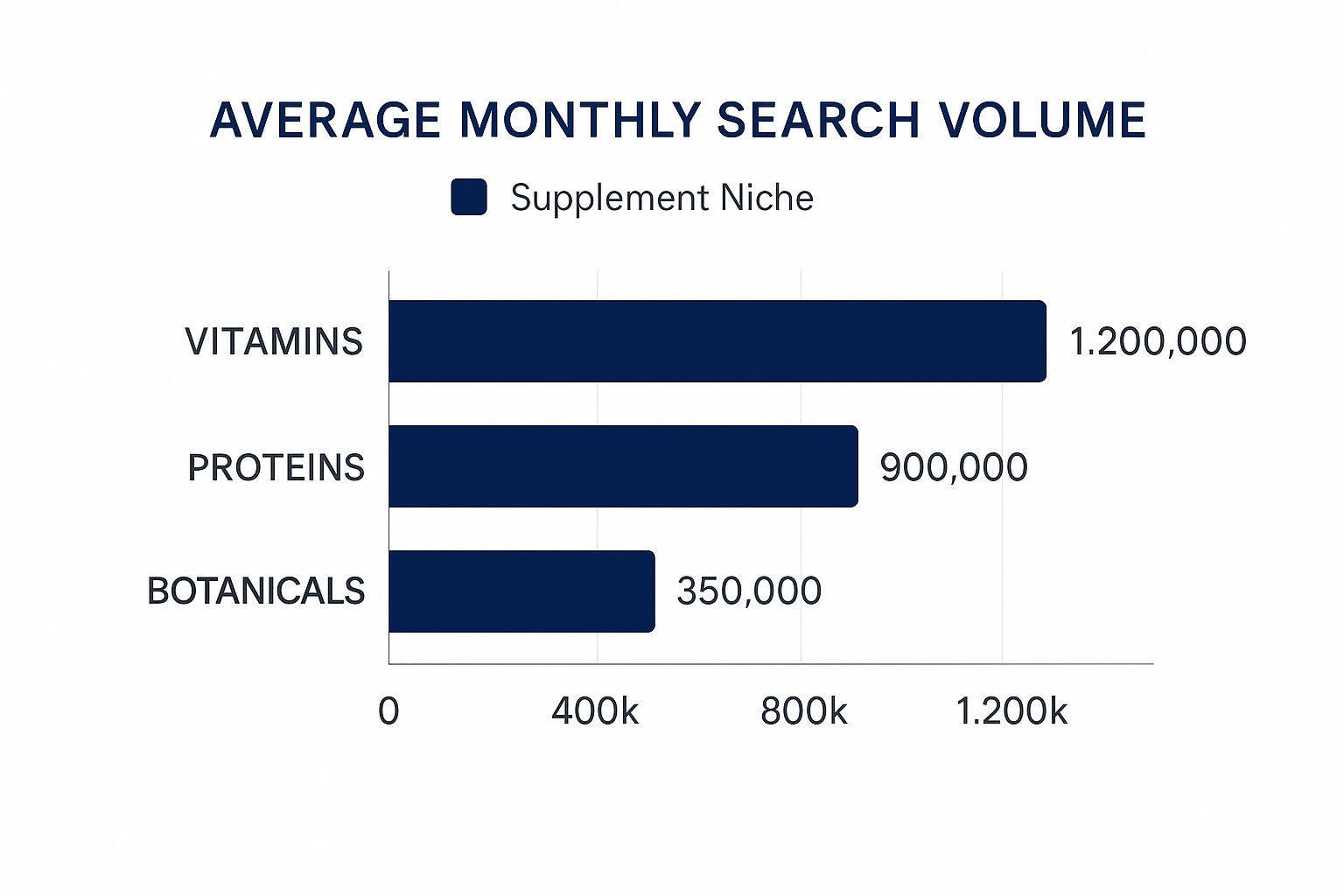
As you can see, "Vitamins" pull in the highest search volume, with "Proteins" and "Botanicals" following. This tells us there's a huge, educated market out there, but you'll need to find your unique angle to stand out.
Choosing a Business Model That Fits Your Goals
Once you know what you want to sell and to whom, you need to figure out how you’re going to get it made. Your budget, timeline, and how much control you want over the final product will guide this decision. There are a few well-trodden paths here, each with its own pros and cons.
Comparing Supplement Business Models
This comparison breaks down the most popular business models for selling supplements online, helping you choose the best approach for your goals.
| Business Model | Upfront Cost | Brand Control | Speed to Market | Best For |
|---|---|---|---|---|
| Private Label | Low ($1k–$5k) | Moderate | Fast (4–6 weeks) | Entrepreneurs wanting custom branding on a proven formula. |
| White Label | Very Low ($500+) | Low | Immediate | Those on a tight budget who need to launch quickly. |
| Custom Formula | High ($10k+) | High | Slow (3–6 months) | Brands with a unique product idea and premium positioning. |
Ultimately, your choice depends on your resources and long-term vision. Private label offers a fantastic middle ground, giving you brand ownership without the hefty R&D costs of a custom formula. White label is the speediest route, but you sacrifice differentiation. A custom formula gives you a true moat around your business, but it requires significant capital and patience.
Staying on the Right Side of Regulations
This is non-negotiable. The supplement industry is regulated by the FDA, and failing to comply can shut down your business before it even gets off the ground. You must understand the basics of Current Good Manufacturing Practices (cGMP) and labeling laws.
Accurate labels and honest, substantiated claims are the foundation of customer trust. Don't make promises you can't back up. Your labels need a clear Supplement Facts panel, a full ingredient list in descending order by weight, and proper allergen warnings. This isn't just a good idea—it's the law.
And this industry isn't slowing down. Projections show the global nutritional supplements market rocketing to $758.99 billion by 2034. That growth will only bring more scrutiny, making compliance more important than ever.
For a deeper dive into the legal and operational steps, our guide on how to start a supplement business is a great resource.
Sourcing and Developing a High-Quality Product
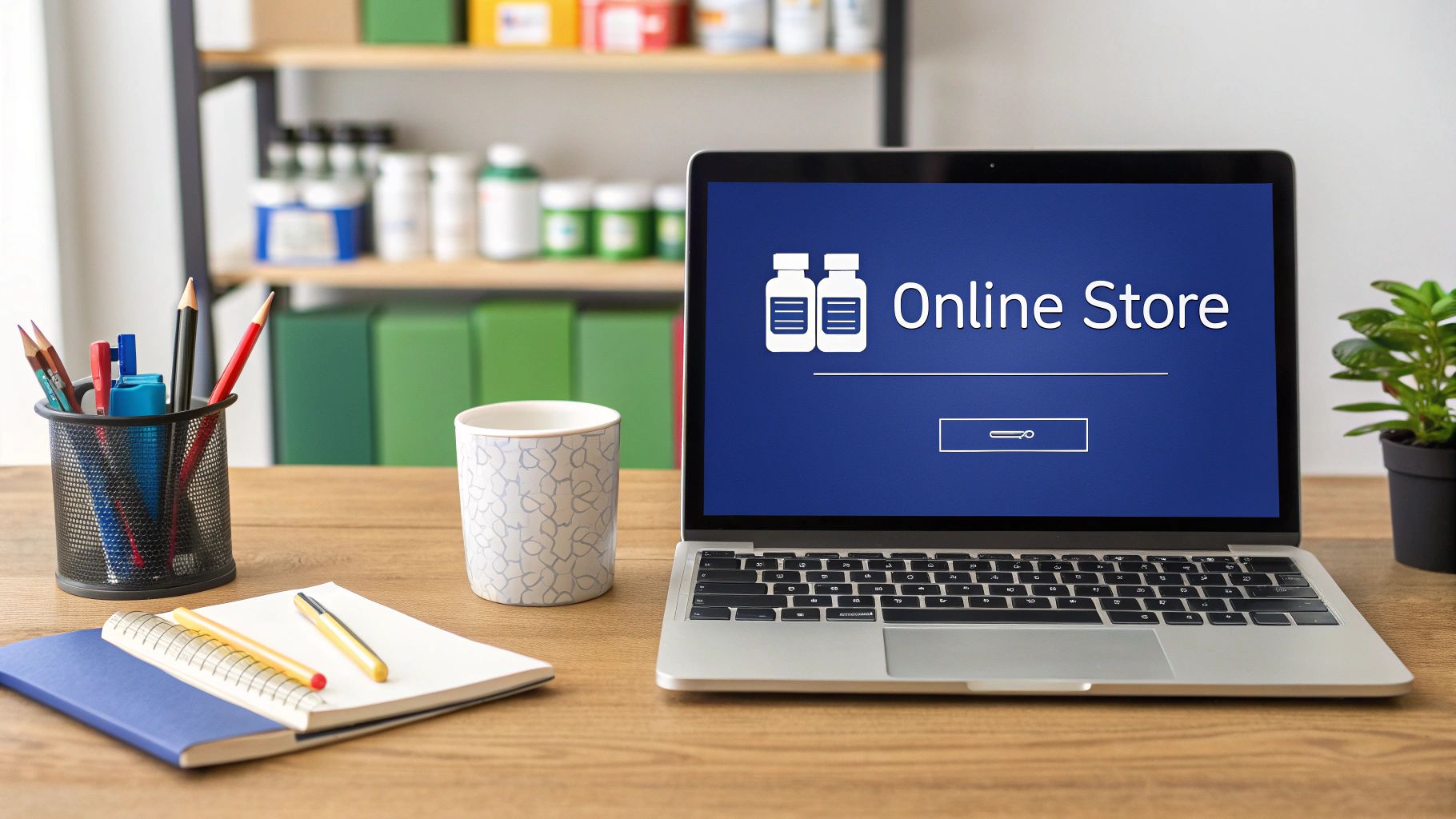 The integrity of your product is everything. It's the bedrock of your entire brand. When you're selling supplements online, customer trust is your most valuable currency, and it all starts with a safe, effective, and high-quality product. This is where you transform an idea into something tangible—an item people will feel confident putting into their bodies.
The integrity of your product is everything. It's the bedrock of your entire brand. When you're selling supplements online, customer trust is your most valuable currency, and it all starts with a safe, effective, and high-quality product. This is where you transform an idea into something tangible—an item people will feel confident putting into their bodies.
Your first, and arguably most critical, decision is choosing the right manufacturing partner. Don't rush this. A bad manufacturer can torpedo your business with contaminated products, legal headaches, and a trashed reputation before you even make your first sale.
Finding a cGMP-Certified Manufacturer
Your search for a manufacturer should have one absolute, non-negotiable requirement: cGMP certification. Current Good Manufacturing Practices are regulations enforced by the FDA, and they're your best insurance policy. They ensure products are consistently produced and controlled according to strict quality standards.
Think of a cGMP-certified facility as your first line of defense against contamination, incorrect dosages, and shoddy ingredients. But don't just take their word for it. When vetting potential partners, go beyond a simple "yes" on their cGMP status. It's on you to dig deeper and really understand their commitment to quality.
A manufacturer isn't just a vendor; they are a direct extension of your brand. Their standards become your standards, so choose a partner whose commitment to quality matches your own.
Ask to see a copy of their cGMP certificate. It’s also smart to look for any warning letters they may have received from the FDA. This due diligence isn't just a box to check—it's essential for protecting your business and your future customers.
Essential Questions to Ask Every Potential Supplier
Once you have a shortlist of cGMP-certified manufacturers, it's time to start asking questions. A good partner will welcome your scrutiny. Your goal here is to get a feel for their processes, transparency, and capabilities.
Come prepared with a list of inquiries that covers the whole production cycle:
- Raw Material Sourcing: Where do your raw ingredients come from? Can you provide documentation tracing them back to their origin?
- Third-Party Testing: Do you conduct independent lab testing for purity, potency, and contaminants? Can we see a sample Certificate of Analysis (COA)?
- Production Capabilities: What are your minimum order quantities (MOQs)? What’s the typical lead time from placing an order to delivery?
- Compliance Support: Do you have experience with specific labeling requirements for platforms like Amazon or Shopify?
The way they answer these questions will tell you a lot. A manufacturer who gets cagey about their sourcing or testing protocols is a massive red flag.
Developing Your Unique Formulation
After you've locked in a trustworthy manufacturer, the fun part begins: creating your product. A great way to start is with a private label product. This is where you put your brand on a manufacturer’s existing, proven formula. It’s a fantastic way to get into the market quickly with lower risk and investment.
For example, exploring options for private label liquid supplements can be a smart entry point. Liquids often have better bioavailability and are a growing trend among consumers.
As your brand gains traction, you'll likely want to develop a custom formula. This is where you can build a real competitive advantage by creating something no one else has. You’ll work directly with professionals like food scientists, chemists, and nutritionists—many of whom are on staff at top-tier manufacturing partners.
The custom formulation process generally looks something like this:
- Define Your Goal: Get crystal clear on the problem your supplement solves.
- Ingredient Research: Select ingredients backed by science, in dosages that actually work.
- Formulation & Flavoring: Collaborate with experts to create a product that is stable and tastes great.
- Testing & Refinement: Run pilot batches and sensory testing to get the formula just right.
This development path is an investment, for sure. But it’s how you build a brand with staying power and create a product that customers will trust, love, and buy again and again.
Building a Trustworthy E-commerce Brand
Think of your website as more than just a digital cash register. It's your virtual storefront, the place where a potential customer decides, often in just a few seconds, if they can trust you with their health. When you're asking someone to put your product in their body, a slick, professional, and transparent online presence isn't just a "nice-to-have"—it's everything. This is where your brand story, product integrity, and customer experience all need to click.
The bedrock of your online store is your e-commerce platform. While there are a lot of options out there, two giants, Shopify and BigCommerce, consistently lead the pack with their powerful features and ability to grow with you. For a supplement brand, this decision goes deeper than just picking nice-looking themes. You need a platform that can handle the unique demands of the health and wellness industry.
Choosing Your E-commerce Platform
Shopify often gets praise for its incredibly user-friendly interface and a massive app ecosystem. This makes it a fantastic choice for entrepreneurs who want to get a beautiful store up and running quickly without a steep learning curve. The real magic for supplement sellers, though, is in its App Store. You can find proven solutions for everything from managing recurring subscriptions to adding tools that help with compliance.
BigCommerce takes a different approach. It builds more of this core functionality directly into the platform, which can mean you're less reliant on third-party apps. It's particularly known for its strong, out-of-the-box SEO capabilities and its ability to handle huge, complex product catalogs without tacking on extra fees—a big plus if you're planning an extensive product line.
Let's break down a few features that really matter for supplement brands:
| Feature | Shopify | BigCommerce |
|---|---|---|
| Subscription Tools | Widely available via powerhouse apps like Recharge or Bold Subscriptions. | Offers a native subscription management tool built right in. |
| Ease of Use | Generally seen as the easier path for total beginners to get started. | Has a bit more of a learning curve, but the built-in features are robust. |
| Compliance | Apps and themes are highly customizable for adding FDA disclaimers. | Similar customization options are available through its platform. |
| Transaction Fees | Uses its own Shopify Payments to avoid extra fees; fees apply if you use other gateways. | No transaction fees on any plan, which can be a significant long-term saving. |
So, what's the verdict? It really boils down to your technical comfort level and your business model. If you prioritize simplicity and want access to a nearly limitless app marketplace, Shopify is a fantastic choice. If you'd rather have more features baked in from the start and want to avoid transaction fees entirely, BigCommerce deserves a very serious look.
Designing an Experience That Inspires Confidence
Once you've locked in your platform, the real work begins: creating a user experience that screams trustworthiness. In an industry where credibility is your most valuable currency, your site's design and content must work in harmony to build confidence from the moment someone lands on your page.
First up, professional product photography. Let's be blunt: grainy, low-res images from your phone won't cut it. You need to invest in high-quality shots that clearly show your product, the label, and especially the Supplement Facts panel. Adding a few lifestyle photos that show your product in a real-world context can also help customers imagine it as part of their daily routine.
Next, get your product descriptions right. They must be:
- Clear and Concise: Explain what the product is and who it's for, but cut the confusing jargon.
- Compliant: This is critical. You cannot make disease claims. Stick to approved structure/function claims and always, always include the mandatory FDA disclaimer.
- Transparent: Be completely upfront about your ingredients and what they're there for.
The most powerful way to earn a customer’s trust is to give them every single reason to believe you. Post your third-party lab results—your Certificates of Analysis (CoAs)—and make them easy to find. Link to them right from the product page or create a dedicated "Our Quality" section. This level of transparency is a massive differentiator.
Finally, weave a compelling brand story throughout your entire site. Why did you start this company? What’s your mission? People connect with brands that have a real purpose beyond just making a sale. Share your passion for health and wellness, and you’ll start building a loyal community that truly believes in what you're doing. That’s how you turn one-time buyers into lifelong advocates for your brand.
Mastering Supplement Fulfillment And Logistics
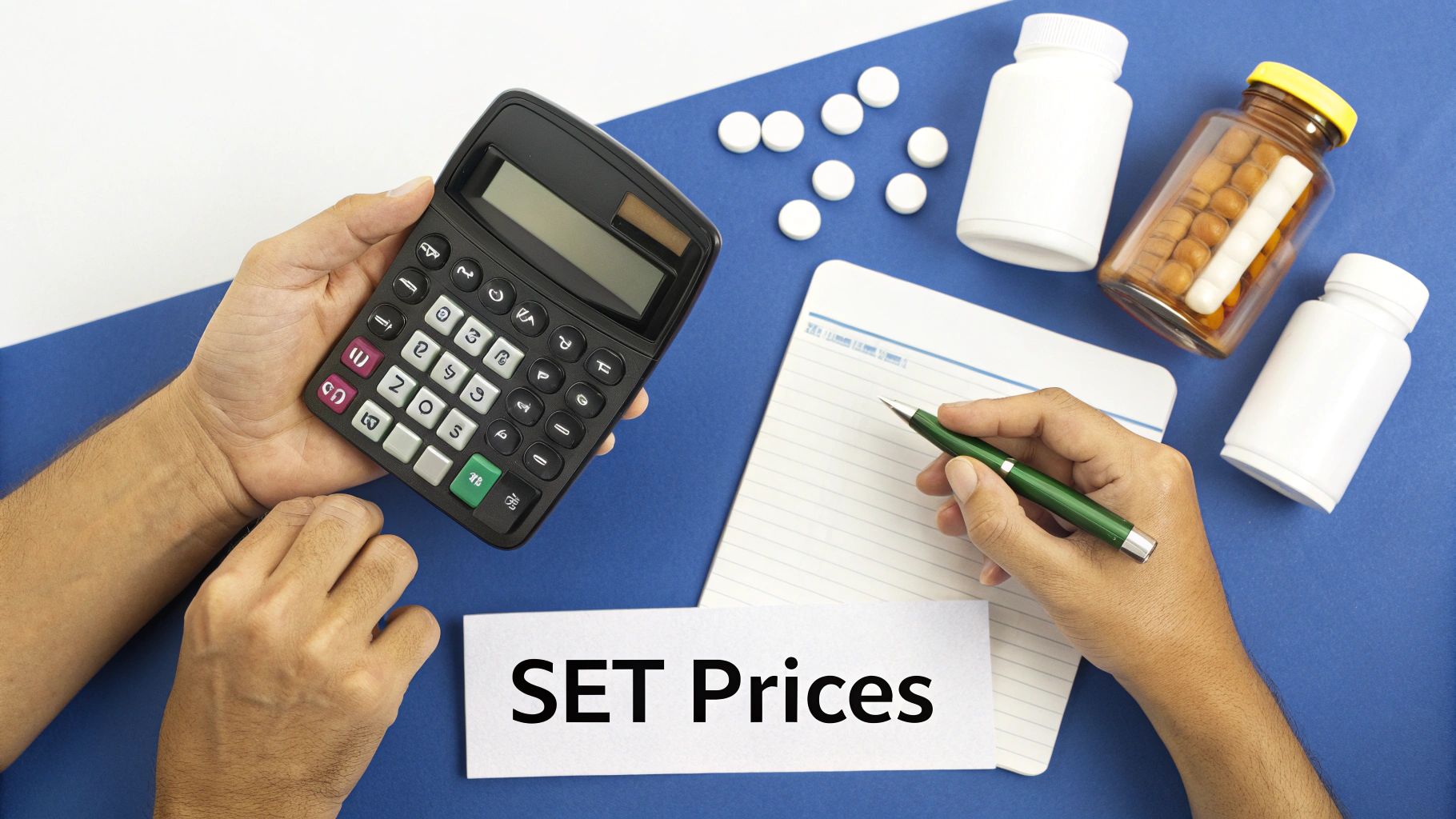
This is where the operational rubber meets the road. Getting your supplements from a warehouse into your customer's hands might not be the sexiest part of the business, but a slow or clumsy fulfillment process can undo all the hard work you’ve poured into your products and marketing.
When you’re just starting, handling fulfillment yourself seems like the obvious choice. Packing orders in your garage or spare room gives you total control, and you can add those personal touches like handwritten notes. But this DIY approach has a very short shelf life. Before you know it, you’re drowning in packing tape and post office runs instead of focusing on actually growing your business.
This is the exact moment when a Third-Party Logistics (3PL) provider becomes your best friend. These companies specialize in handling the entire backend process for you—warehousing, picking, packing, and shipping. For a supplement brand, finding the right 3PL is one of the most crucial decisions you'll make.
Choosing The Right Fulfillment Partner
Not all 3PLs are built the same, especially when you're dealing with health products. Your top priority needs to be finding a partner who gets the unique demands of the supplement industry.
The first question you should ask any potential 3PL is about climate-controlled warehousing. This is non-negotiable. Many active ingredients in supplements, like probiotics and certain botanicals, are incredibly sensitive to heat and humidity. A standard warehouse can cook the potency right out of your products, leaving customers with something ineffective. Climate control protects your inventory and your brand's integrity.
Equally important is robust lot tracking. This is the system that tracks a specific batch of product from the factory floor all the way to a customer’s front door. If there’s ever a product issue or, worst-case scenario, a recall, you absolutely must be able to pinpoint who received products from that specific batch. It's a critical component of consumer safety and FDA compliance.
A seamless fulfillment experience is one of the most powerful—and often overlooked—ways to build customer loyalty. A customer who receives their order quickly and correctly is far more likely to become a repeat buyer.
Smart Shipping And Returns Management
Your fulfillment strategy doesn’t end when the box is sealed. How you handle shipping costs and returns is a huge part of the overall customer experience and can directly impact your sales.
Offering "free shipping" is a powerful conversion tool, but remember, it’s never truly free. You have to build that cost into your pricing to protect your margins. A popular and effective strategy is offering free shipping on orders above a certain amount, like $50. This encourages customers to add more to their cart.
Of course, none of this works without solid warehouse inventory management. You need a system that prevents stockouts on your best-sellers while not letting you over-order on slower-moving items. Good inventory management is the engine that keeps your fulfillment running smoothly.
Finally, don't neglect your returns policy. Make it clear, simple, and easy to find on your site. A complicated or difficult return process can permanently poison a customer's view of your brand. In fact, a hassle-free return can sometimes turn a negative experience into a positive one, showing customers you stand behind your products and value their business.
Effective Marketing for Your Supplement Brand
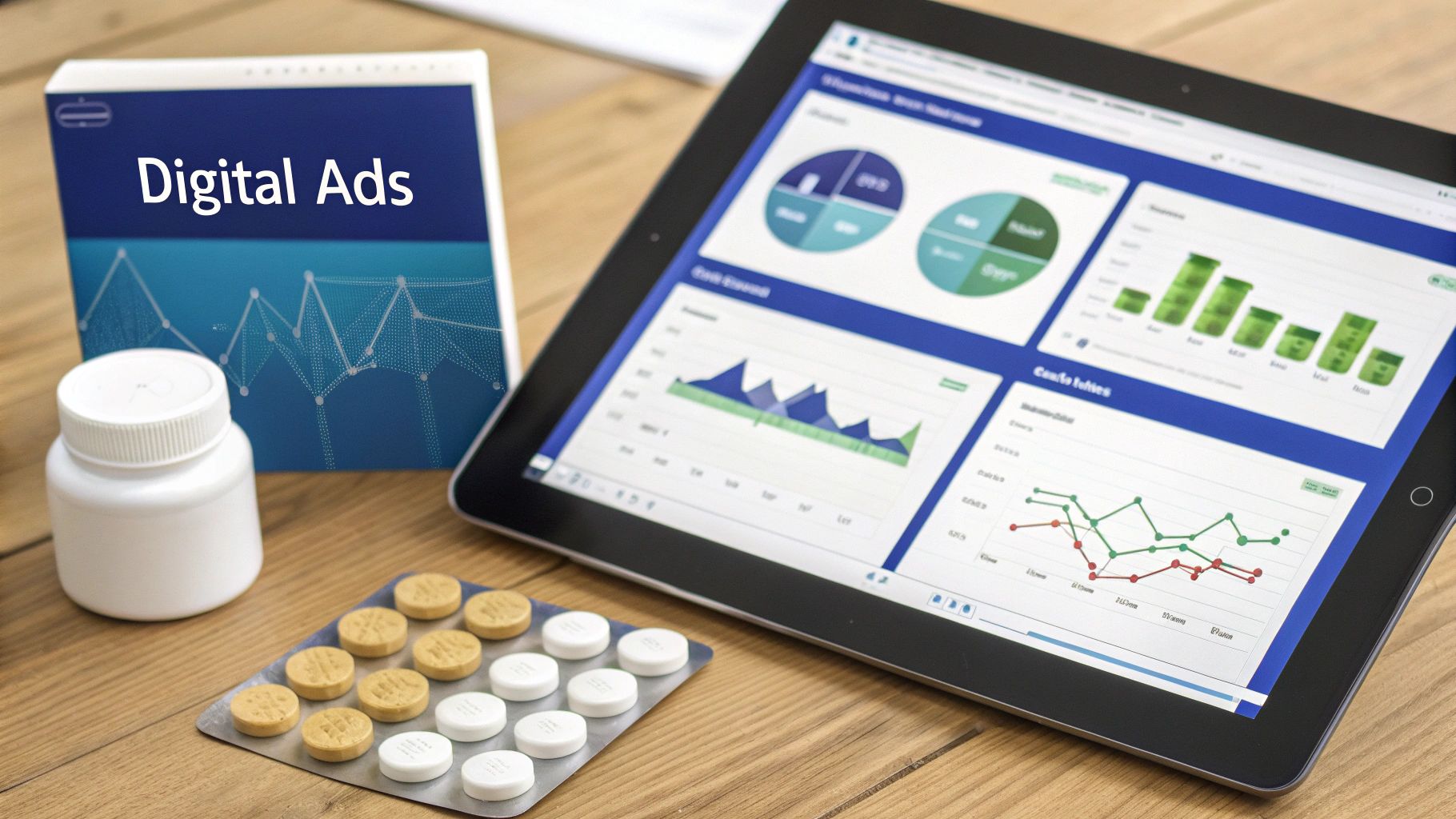 Let's be honest: a great product is just the price of admission. The real challenge is getting that product into the right hands, and that's where smart marketing comes in. Selling supplements online isn't about who has the flashiest ads. It's about building genuine authority and connecting with people who are actively looking for help with their health.
Let's be honest: a great product is just the price of admission. The real challenge is getting that product into the right hands, and that's where smart marketing comes in. Selling supplements online isn't about who has the flashiest ads. It's about building genuine authority and connecting with people who are actively looking for help with their health.
And the opportunity is staggering. The dietary supplements market hit USD 92.06 billion in 2024 and is on track to explode to USD 179.71 billion by 2032. This isn't just a trend; it's a global shift toward people taking control of their own health, creating a massive audience for brands that know how to market themselves responsibly.
Establish Authority with Content Marketing
In the supplement world, your most powerful marketing tool is education. People are starving for credible information, and when you're the one providing it, you instantly become a trusted authority. This isn't about a hard sell. It's about answering your customers' questions long before they even think about buying.
Put yourself in their shoes. What are they typing into Google? Things like "how to improve sleep quality naturally" or "best supplements for joint support." Your job is to create the best, most helpful content that answers those exact questions.
Here's what that looks like in practice:
- Evidence-Based Blog Posts: Go deep. Write articles that explore the science behind your ingredients. Don't be afraid to link to scientific studies, but break down the complex topics so they're easy for anyone to understand.
- Educational Videos: Video is huge. You could film short, punchy clips for social media or create longer YouTube videos featuring a nutritionist or demonstrating how to mix your product into a smoothie.
- Downloadable Guides: Offer a free, valuable resource like "A Beginner's Guide to Nootropics" in exchange for an email. This is a classic win-win: they get useful information, and you start building your email list.
Here's a pro-tip I've seen countless brands get wrong: Don't make all your content about your product. Make it about your customer's problem. When you become their go-to source for health advice, they'll naturally come to you when they're ready to make a purchase.
Navigating Paid Advertising Channels
Paid ads can pour fuel on your growth, but for supplement brands, it's a minefield. Platforms like Google and Meta (Facebook/Instagram) have incredibly strict policies about health claims. One wrong move and you could find your ad account suspended, which is a very real—and very frustrating—risk.
Your ad copy and landing pages have to be 100% compliant. This means no disease claims ("cures insomnia") and no promises of specific results. Instead, focus on the benefits that stick to approved structure/function claims, like "Promotes restful sleep."
Many successful brands don't even send ad traffic directly to a product page. They send it to an educational blog post first. This "soft sell" approach warms up the audience and is seen as less aggressive by the ad platforms. It might be a longer path to a sale, but it's a much safer one. You can also successfully sell supplements on Amazon, but that’s a whole different ballgame with its own set of advertising rules you'll need to master.
The Power of Authentic Partnerships
Influencer marketing can be a goldmine in the wellness space, but authenticity is everything. Your audience has a finely tuned radar for a disingenuous cash grab. You need to find partners who truly align with your brand's values and whose audience trusts them implicitly.
Don't just chase the big names. Look for micro-influencers—those with smaller, but hyper-engaged followings. An endorsement from them often feels more like a recommendation from a trusted friend than a paid ad. Just make sure they always follow FTC guidelines and clearly disclose the partnership.
Retain Customers with Smart Email Marketing
It costs a lot more to find a new customer than to keep an existing one. That’s why email marketing is your secret weapon for building relationships that last and driving those all-important repeat purchases.
Your email strategy needs to be more than just sale announcements. Send newsletters packed with educational content, share your latest blog posts, and give your subscribers exclusive access to new information. To truly take things to the next level, you can use personalized marketing automation strategies to send targeted messages based on what a customer has already bought.
Imagine this: a customer buys a 30-day supply of your sleep supplement. Around day 25, an automated email goes out with a friendly reminder to reorder, maybe with a small discount to sweeten the deal. This one simple tactic can have a massive impact on your customer lifetime value.
Common Questions About Selling Supplements Online
Getting into the online supplement game means you're going to have questions. A lot of them. From navigating legal minefields to figuring out what you can (and can't) say about your products, it's totally normal to feel a bit overwhelmed.
Let's cut through the noise and tackle some of the most common questions I hear from new brand owners. Getting these right from the start is what separates the brands that last from the ones that fizzle out.
Do I Need FDA Approval to Sell Supplements?
This is probably the biggest point of confusion for newcomers, and it's a critical one. The short answer is no, you do not need pre-market approval from the FDA to sell dietary supplements.
But don't get too comfortable. This isn't a free-for-all. Unlike prescription drugs that go through a long and expensive approval gauntlet, supplements operate under a different set of rules. Your brand and your manufacturer are still legally on the hook to follow every FDA regulation. That means producing everything in a cGMP-certified facility and making sure every word on your labels and website is truthful and not misleading.
Think of it this way: the FDA might not give you a green light to start, but they can absolutely give you a red light if you step out of line.
What Kind of Business Insurance Is Necessary?
When you’re bootstrapping a new brand, every dollar counts. I get it. But there's one expense that is absolutely non-negotiable: product liability insurance.
This insurance is your financial shield. It protects your business if a customer claims your product caused them some kind of harm or damage. It's not just a "nice to have"—it's a must. Most quality cGMP manufacturers, distributors, and even major retailers won't even consider working with you unless you can show them proof of coverage.
Think of product liability insurance as your brand's ultimate bodyguard. You hope you'll never need it, but if a problem arises, it can be the single thing that saves your company from a catastrophic financial and legal event.
Can I Make Health Claims About My Products?
This is where the regulatory waters get really murky, and it's where a lot of new brands find themselves in hot water. You can make certain claims, but you have to know the difference between what's allowed and what's forbidden.
The FDA allows for "structure/function" claims. These are carefully worded statements about how an ingredient supports the normal structure or function of the body.
- A perfect example is, "calcium builds strong bones."
- Another common one is, "fiber maintains bowel regularity."
What you absolutely cannot do is make "disease claims." These are statements suggesting your product can diagnose, treat, cure, or prevent any illness. Saying your supplement "lowers high cholesterol" or "cures insomnia" is a disease claim, and it's the fastest way to get an FDA warning letter in your mailbox.
And here's the kicker: any structure/function claim you make must be paired with the mandatory FDA disclaimer: "This statement has not been evaluated by the Food and Drug Administration. This product is not intended to diagnose, treat, cure, or prevent any disease." No exceptions.
Is This a Good Time to Enter the Market?
With a new supplement brand popping up every other day, it's easy to look at the competition and wonder if you've missed the boat. Is the market just too crowded?
While it's true there's a lot of competition, the global interest in health and wellness is growing even faster. Just look at the Asia Pacific region. The dietary supplements market there is projected to explode from USD 71.64 billion in 2024 to an estimated USD 176.12 billion by 2034. That’s not just growth; it's a massive wave of opportunity driven by a powerful surge in health awareness. You can discover more about this impressive market growth on Precedence Research.
The takeaway here is that the customer pool is expanding at a breakneck pace. The secret isn't to try and sell to everyone. It's to find your specific niche and serve that audience better than anyone else.
Ready to turn your vision for a liquid supplement into a market-ready product? The experts at Triton Nutra Group can guide you through every step, from custom formulation to cGMP-compliant manufacturing and fulfillment. Learn how to launch your brand with a trusted partner at https://tritonnutragroup.com.